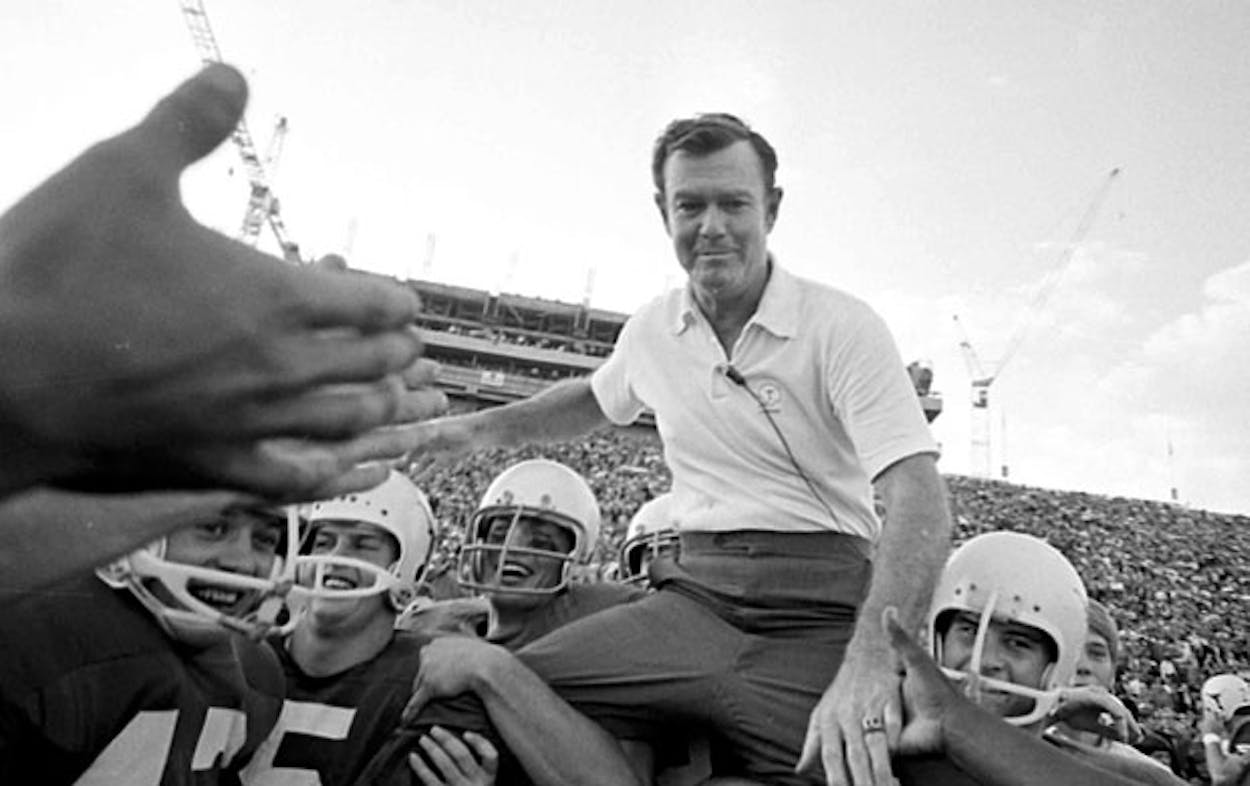When Texas Monthly made a list of the state’s greatest college football coaches in September of 2011, it wasn’t very hard to guess who’d finish number one: Darrell K. Royal, who died at the age of 88 on Wednesday morning.
Royal won three national championships and eleven Southwestern Conference titles at the University of Texas. He invented the Longhorns helmet logo, and actually popularized the phrase “Dance with the one who brung ya” (or, depending on who is reporting, “Dance with the one that brung ya” or “dance with who brung ya”). His name is on the University of Texas stadium for a reason.
And in October 2009, Texas Monthly‘s own The Texanist named “Right 53 Veer Pass,” from 1969’s “Game of the Century” between Texas and Arkansas, as the greatest play in Texas college football history.
Coach Royal will be honored with a memorial service at the Frank Erwin Center Tuesday. Wednesday night, the Texas Tower glowed orange, and on Twitter, current UT coach Mack Brown promised a tribute for Saturday’s home game against Iowa State:
Today we mourn the loss & Sat we celebrate. We’ll wear a DKR decal on our helmet & we’ll honor coach by lining up in wishbone to start game
— Mack Brown (@UT_MackBrown) November 7, 2012
The cause of Royal’s death was complications from cardiovacular disease, but he had also been suffering from Alzheimer’s. His family’s Alzheimer’s foundation was already in the middle of a charity auction of the coach’s memorabilia.
Kirk Bohls of the Austin American-Statesman has what is surely the most comprehensive obit, as well as his own personal remembrance.
In the September, 1996 Texas Monthly, on the occasion of the renaming of Texas Memorial Stadium as Darrell K. Royal-Texas Memorial Stadium, the coach was the subject of the magazine’s Last Page feature. Among the tidbits from writer Anne Dingus:
Born July 6, 1924, Darrell K. Royal has a middle initial but no middle name. The “K” is in honor of his mother, Katy, who died when he was an infant. She succumbed to cancer, but because of the taboo then surrounding the disease, Royal was led to believe until he was grown that she had died giving birth to him.
A native of Hollis, Oklahoma, Royal was made an honorary Texan by the Texas House of Representatives after his first UT season.
His friends call him Delbert, a code name devised during his heyday to keep his identity and location a secret from the media.
Referring to his friendship with the singer, an avowed pot smoker, Royal once assured fans that he had never touched marijuana himself: “Heck, no—never have, never will.”
And from Jan Reid’s November 1997 interview with Royal, John David Crow and Sammy Baugh, this quote from the coach:
I wasn’t near as anti-pass as my reputation made me out to be. We worked hard on it, and every big game we won—every one—the turning point was a completed forward pass. All that got started one day when I was kidding around with the press. Some guy said, ‘Well, when are you going to start throwing the ball?’ I made a flippant remark: ‘When you pass, three things can happen, and two of them are bad.’ After that, I was so conservative I had to look two ways before I’d cross a one-way street. And I kind of enjoyed the banter. But at the time the guy asked the question, we were leading the nation in scoring! I thought that’s how they measured offense.
Writer Jim Atkinson, from his “Texas Primer” on the wishbone offense, October, 1985:
Between 1968 and 1977, when Royal retired and new coach Fred Akers scrapped the system, the wishbone won the Horns two national titles and trips to six consecutive Cotton Bowls, earning the team a remarkable 80-19-2 win-loss record. It invariably produced flamboyant results; forty points and five hundred yards of total offense per game became commonplace for Texas teams during the wishbone era. It made fleeting stars of moderately talented athletes like Street and made legends of gifted runners like Roosevelt Leaks, Earl Campbell, Greg Pruitt, and Billy Sims. It restored an old-fashioned regionalism to college football. The casual New Year’s Day bowl watcher didn’t really need a scorecard to know that the team ramming the ball down the field like a Roman phalanx was from the South or Southwest and that the one putting the ball in the air was from the West or East Coast. In that way, the wishbone made the relationship between Texas and football all the more transcendent.
Royal also sat down with then-Texas Monthly editor Evan Smith for an episode of Texas Monthly Talks in 2004:
And, five more Royal reads from around Texas and the country:
1. The Houston Chronicle‘s Randy Harvey remembers covering the coach, including how he’d never heard of Willie Nelson until Royal clued him in. “My circle of classmates at Texas was more likely to listen to Jefferson Starship, the Who, Janis and Jimi,” Harvey wrote.
2. TM contributor Michael Corcoran traced the Nelson/Royal friendship’s history for the Austin American-Statesman in 2011.
3. A Barking Carnival article published prior to last month’s Red River shootout recalls the heated 1976 game, which saw Royal accusing Oklahoma’s Barry Switzer of spying on the Longhorns’ pratice. It was then that Switzer spat, “Some coaches would rather listen to guitar pickers than work hard.”
4. The Associated Press offers “A sampling of colorful Darrell Royal quotes.”
5. ESPN’s Ivan Maisel, who wrote about Royal’s relationship with Lyndon B. Johnson earlier this year, also memorialized him Tuesday. Maisel quotes Royal as saying “This is it, Edith — it’s the University of Texas!” to his wife when UT athletic director Dana Bible called to offer him the job.
And finally, The Longhorn Network’s lengthy tribute to the man who, as Brown says in its first moment, “is Texas football.”







